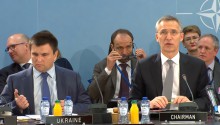“We can cooperate still more closely” was the slogan of the first day of the NATO foreign minters’ meeting. In addition to the intensification of relations between the EU and the North Atlantic Alliance, it was also about support for Ukraine. A number of important statements were made.
The first one was from Jen Stoltenberg and Federica Mogherini. NATO and the EU are going to agree on 40 proposals in seven areas, including joint struggle against hybrid threats, intensified cooperation at sea, and synchronization of exercises. It is also planned to set up in 2017 a European center for countering hybrid threats in which, according to Minister Klimkin, Ukraine will participate. Asked by The Day’s correspondent about how the intensified and expanded cooperation between NATO and the EU can help Ukraine, NATO Secretary General Jens Stoltenberg said: “The idea of today’s statement is that from now on we will cooperate more closely in supporting the establishment of a defense potential in such countries as Ukraine.” In her turn, Federica Mogherini, EU High Representative for Foreign Affairs and Security Policy, emphasized that Ukraine would remain on top of the agenda on both sides of the Atlantic.
The second one was from US Secretary of State John Kerry who came to Brussels for the last time in this status. He said the new US administration would not change its commitment to NATO or concede in the fundamental questions about Ukraine. “We will restate, as we have consistently, that we do not support or recognize Russia’s purported annexation of Crimea or accept its continued aggression in the eastern part of the country. The change of an administration in the United States will not change the unwavering commitment of the United States to its principles and Article 5 of the Warsaw Treaty,” he said. The state secretary also called on the NATO countries to increase defense expenditures. “And right now there are five countries in NATO that are at the goal, the established goal of 2 percent for every member country: the United States, the UK, Greece, Poland, and Estonia. It is a positive tendency that 24 allies have stopped the long trend of decline. We must be sure that the collective security system will not fall hostage to a situation when one of the countries fails to meet its financial commitments,” Kerry emphasized.
The meeting of the Ukraine-NATO Commission began in the morning of December 7. Jens Stoltenberg spoke about continuing to support Ukraine throughout the meeting of foreign ministers. “We have a very comprehensive cooperation with Ukraine and we provide support in many different ways. At the Warsaw Summit, we adopted the Comprehensive Assistance Package for Ukraine. Our meeting today was an opportunity to review its implementation.” The NATO Secretary General underlined the necessity of continuing to apply economic sanctions against Russia and regretted that the Normandy-format meeting past week had produced no results. In his view, “diplomacy offers the only viable solution to the crisis in Ukraine.”
Ukraine’s Minister of Foreign Affairs Pavlo Klimkin said, to begin with, that all the participants in the special commission had emphasized that they did not recognize the annexation of Crimea and particularly focused on the Donbas. “Ukraine will remain one of the Alliance’s fundamental priorities,” he said.
Klimkin is convinced that we have already made considerable progress in line with NATO standards and met 120 criteria. “What is important is our progress in planning and training special operation forces and countering Russian propaganda,” he stressed. At the same time, the foreign minister is aware that there still is very much work to do and, moreover, he considers trans-Atlantic cooperation a top priority. “We must go further so that Ukraine gradually becomes NATO’s eastern flank. We must work for a better understanding of the situation, which includes exchange of intelligence data, planning, and joint exercises. This must also apply to the Black Sea region, one of the most dangerous regions because of the Russian aggression,” he added. Klimkin invited the NATO secretary general and the North Atlantic Council to visit Ukraine next year.
Alexander Vinnikov, director of the NATO Liaison Office in Ukraine, who attended the commission meeting, has told The Day about the results. “The discussion can be divided into the political and practical parts. From the political angle, emphasis was put on the security situation in eastern Ukraine. The participants particularly noted the increased number of ceasefire violations and called again for a full implementation of the Minsk Agreements, focusing on Russia’s responsibility for this. They also expressed support for the OSCE Special Monitoring Mission and said that it should be allowed to monitor the entire occupied territory. From the practical angle, it was the first opportunity to sum up the implementation of a comprehensive aid package received six months ago at the Warsaw summit. NATO also confirmed its commitments to support the process of changes in Ukraine. Reforms and important steps were duly appreciated. But it was also said that Ukraine should redouble its efforts in carrying out and increasing the effectiveness of reforms. There is still very much work to do. The Alliance at last appraised Ukraine’s Annual National Program, describing in detail the positive results of efforts,” he said. On the whole, in his words, NATO “keeps its door open,” but Ukraine’s integration is not on the agenda. We still have to improve in many fields, such as compliance with standards, the economy, and human rights. In his words, Ukraine should focus on reforming. To help understand the “knots” of Ukraine’s contemporary history, which brought about “malign tumors” of systemic political and economic problems on the state’s body, The Day’s correspondent presented the director of the NATO Liaison Office in Ukraine with the Den Library’s English-language book A Case without a Statute of Limitations.
Read the final column about the meeting of NATO foreign ministers and a special commission on Ukraine in one of The Day’s next issues.








